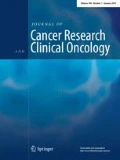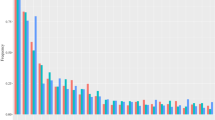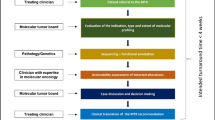Abstract
Purpose
In this study, we aimed to identify a DNA methylation pattern suitable for prognosis assessment of muscle-invasive bladder cancer and to investigate metastasis-associated processes regulated by DNA methylation.
Methods
Genome-wide methylation analysis was performed on 23 muscle-invasive bladder tumors by microarray analysis. Validation was performed by the qAMP technique in two different patient cohorts (n = 32 and n = 100). mRNA expression was analyzed in 12 samples. Protein expression was determined using tissue microarrays of 291 patients. Bladder cancer cell lines T24 and 253JB-V were used for functional analyses.
Results
Microarray analyses revealed KISS1R, SEPT9 and CSAD as putative biomarkers with hypermethylation in node-positive tumors. The combination of the three genes predicted the metastatic risk with sensitivity of 73% and specificity of 71% in cohort 1, and sensitivity of 82% and specificity of 54% in cohort 2. mRNA expression differences were detected for KISS1R (p = 0.04). Protein expression of KISS1R was significantly reduced (p < 0.001). Knockdown of SEPT9v3 resulted in increased cell migration by 28% (p = 0.04) and increased invasion by 22% (p = 0.004). KISS1R overexpression resulted in decreased cell migration (25%, p = 0.1).
Conclusions
We identified a methylation marker panel suitable to differentiate between patients with positive and negative lymph nodes at time of cystectomy. This enables a risk assessment for patients who potentially benefit from extended lymph node resection as well as from neoadjuvant chemotherapy and could improve the survival rates. Furthermore, we examined the impact of putative markers on tumor behavior. Hence, KISS1R and SEPT9 could represent a starting point for the development of novel therapy approaches.






Similar content being viewed by others
References
Booth CM, Tannock IF (2015) Benefits of adjuvant chemotherapy for bladder cancer. JAMA Oncol 1(6):727–728. https://doi.org/10.1001/jamaoncol.2015.1210
Connolly D, Yang Z, Castaldi M, Simmons N, Oktay MH, Coniglio S, Fazzari MJ, Verdier-Pinard P, Montagna C (2011) Septin 9 isoform expression, localization and epigenetic changes during human and mouse breast cancer progression. Breast Cancer Res 13(4):R76. https://doi.org/10.1186/bcr2924
Dennis G Jr, Sherman BT, Hosack DA, Yang J, Gao W, Lane HC, Lempicki RA (2003) DAVID: database for annotation, visualization, and integrated discovery. Genome Biol 4(5):P3
Dhawan D, Hamdy FC, Rehman I, Patterson J, Cross SS, Feeley KM, Stephenson Y, Meuth M, Catto JW (2006) Evidence for the early onset of aberrant promoter methylation in urothelial carcinoma. J Pathol 209(3):336–343. https://doi.org/10.1002/path.1991
Esteller M (2007) Epigenetic gene silencing in cancer: the DNA hypermethylome. Hum Mol Genet 16(Spec No 1):R50–R59. https://doi.org/10.1093/hmg/ddm018
Hope DB (1955) Pyridoxal phosphate as the coenzyme of the mammalian decarboxylase for l-cysteine sulphinic and l-cysteic acids. Biochem J 59(3):497–500
Ji K, Ye L, Mason MD, Jiang WG (2013) The Kiss-1/Kiss-1R complex as a negative regulator of cell motility and cancer metastasis (review). Int J Mol Med 32(4):747–754. https://doi.org/10.3892/ijmm.2013.1472
Jones PA, Baylin SB (2002) The fundamental role of epigenetic events in cancer. Nat Rev Genet 3(6):415–428. https://doi.org/10.1038/nrg816
Kremer BE, Adang LA, Macara IG (2007) Septins regulate actin organization and cell-cycle arrest through nuclear accumulation of NCK mediated by SOCS7. Cell 130(5):837–850. https://doi.org/10.1016/j.cell.2007.06.053
Lehmann J, Franzaring L, Thuroff J, Wellek S, Stockle M (2006) Complete long-term survival data from a trial of adjuvant chemotherapy vs control after radical cystectomy for locally advanced bladder cancer. BJU Int 97(1):42–47. https://doi.org/10.1111/j.1464-410X.2006.05859.x
Margulis V, Lotan Y, Montorsi F, Shariat SF (2008) Predicting survival after radical cystectomy for bladder cancer. BJU Int 102(1):15–22. https://doi.org/10.1111/j.1464-410X.2008.07594.x
McAllister SS, Weinberg RA (2014) The tumour-induced systemic environment as a critical regulator of cancer progression and metastasis. Nat Cell Biol 16(8):717–727. https://doi.org/10.1038/ncb3015
Muir AI, Chamberlain L, Elshourbagy NA, Michalovich D, Moore DJ, Calamari A, Szekeres PG, Sarau HM, Chambers JK, Murdock P, Steplewski K, Shabon U, Miller JE, Middleton SE, Darker JG, Larminie CGC, Wilson S, Bergsma DJ, Emson P, Faull R, Philpott KL, Harrison DC (2001) AXOR12, a novel human G protein-coupled receptor, activated by the peptide KiSS-1. J Biol Chem 276(31): 28969–28975. https://doi.org/10.1074/jbc.M102743200
Niegisch G, Lorch A, Droller MJ, Lavery HJ, Stensland KD, Albers P (2013) Neoadjuvant chemotherapy in patients with muscle-invasive bladder cancer: which patients benefit? Eur Urol 64(3):355–357. https://doi.org/10.1016/j.eururo.2013.06.002
Oakes CC, La Salle S, Robaire B, Trasler JM (2006) Evaluation of a quantitative DNA methylation analysis technique using methylation-sensitive/dependent restriction enzymes and real-time PCR. Epigenetics 1(3):146–152
Olbrich T, Ziegler E, Turk G, Schubert A, Emons G, Grundker C (2010) Kisspeptin-10 inhibits bone-directed migration of GPR54-positive breast cancer cells: evidence for a dose-window effect. Gynecol Oncol 119(3):571–578. https://doi.org/10.1016/j.ygyno.2010.08.018
Phe V, Cussenot O, Roupret M (2009) Interest of methylated genes as biomarkers in urothelial cell carcinomas of the urinary tract. BJU Int 104(7):896–901. https://doi.org/10.1111/j.1464-410X.2009.08696.x
Schuller-Levis GB, Park E (2004) Taurine and its chloramine: modulators of immunity. Neurochem Res 29(1):117–126
Smith SC, Baras AS, Dancik G, Ru Y, Ding KF, Moskaluk CA, Fradet Y, Lehmann J, Stockle M, Hartmann A, Lee JK, Theodorescu D (2011) A 20-gene model for molecular nodal staging of bladder cancer: development and prospective assessment. Lancet Oncol 12(2):137–143
Sorensen AB, Warming S, Fuchtbauer EM, Pedersen FS (2002) Alternative splicing, expression, and gene structure of the septin-like putative proto-oncogene Sint1. Gene 285(1–2):79–89
Stathatos N, Bourdeau I, Espinosa AV, Saji M, Vasko VV, Burman KD, Stratakis CA, Ringel MD (2005) KiSS-1/G protein-coupled receptor 54 metastasis suppressor pathway increases myocyte-enriched calcineurin interacting protein 1 expression and chronically inhibits calcineurin activity. J Clin Endocrinol Metab 90(9):5432–5440. https://doi.org/10.1210/jc.2005-0963
Stein JP, Skinner DG (2006) Radical cystectomy for invasive bladder cancer: long-term results of a standard procedure. World J Urol 24(3):296–304. https://doi.org/10.1007/s00345-006-0061-7
Svatek RS, Hollenbeck BK, Holmang S, Lee R, Kim SP, Stenzl A, Lotan Y (2014) The economics of bladder cancer: costs and considerations of caring for this disease. Eur Urol 66(2):253–262. https://doi.org/10.1016/j.eururo.2014.01.006
Toth K, Galamb O, Spisak S, Wichmann B, Sipos F, Valcz G, Leiszter K, Molnar B, Tulassay Z (2011) The influence of methylated septin 9 gene on RNA and protein level in colorectal cancer. Pathol Oncol Res 17(3):503–509. https://doi.org/10.1007/s12253-010-9338-7
van Hoesel AQ, Sato Y, Elashoff DA, Turner RR, Giuliano AE, Shamonki JM, Kuppen PJ, van de Velde CJ, Hoon DS (2013) Assessment of DNA methylation status in early stages of breast cancer development. Br J Cancer 108(10):2033–2038. https://doi.org/10.1038/bjc.2013.136
van Kessel KE, van de Werken HJ, Lurkin I, Ziel-van der Made AC, Zwarthoff EC, Boormans JL (2017) A reported 20-gene expression signature to predict lymph node-positive disease at radical cystectomy for muscle-invasive bladder cancer is clinically not applicable. PLoS One 12(3):e0174039. https://doi.org/10.1371/journal.pone.0174039
Weber M, Davies JJ, Wittig D, Oakeley EJ, Haase M, Lam WL, Schubeler D (2005) Chromosome-wide and promoter-specific analyses identify sites of differential DNA methylation in normal and transformed human cells. Nat Genet 37(8):853–862. https://doi.org/10.1038/ng1598
Williams SG, Stein JP (2004) Molecular pathways in bladder cancer. Urol Res 32(6):373–385. https://doi.org/10.1007/s00240-003-0345-y
Witjes JA, Comperat E, Cowan NC, De Santis M, Gakis G, Lebret T, Ribal MJ, Van der Heijden AG, Sherif A, European Association of U (2014) EAU guidelines on muscle-invasive and metastatic bladder cancer: summary of the 2013 guidelines. Eur Urol 65(4): 778–792. https://doi.org/10.1016/j.eururo.2013.11.046
Author information
Authors and Affiliations
Corresponding author
Ethics declarations
Conflict of interest
Authors declare that they have no conflict of interest.
Ethical approval
All procedures performed in studies involving human participants were in accordance with the ethical standards of the institutional and/or national research committee, and with the 1964 Helsinki declaration and its later amendments or comparable ethical standards.
Human and animal rights statement
This article does not contain any studies with animals performed by any of the authors.
Informed consent
Informed consent was obtained from all individual participants included in the study.
Rights and permissions
About this article
Cite this article
Stubendorff, B., Wilhelm, K., Posselt, K. et al. A three-gene methylation marker panel for the nodal metastatic risk assessment of muscle-invasive bladder cancer. J Cancer Res Clin Oncol 145, 811–820 (2019). https://doi.org/10.1007/s00432-018-02829-4
Received:
Accepted:
Published:
Issue Date:
DOI: https://doi.org/10.1007/s00432-018-02829-4




